Turn Sustainability into Profit
Explore the Green Tech Guide for Sustainable Business Success

Setting Up Solar

Biofuel Machinery

Government Schemes
Table of Contents
Top 15 Green Tech Startups in India Revolutionizing Sustainability
India is experiencing a boom in green tech startups that are spearheading sustainable innovations. This article delves into the top 15 green tech startups in India, showcasing how they are transforming renewable energy, waste management, and sustainable manufacturing, and making a significant impact on the environment.
Key Takeaways
Green tech startups in India are rapidly evolving, focusing on sustainable solutions across various sectors, including renewable energy, waste management, and water conservation.
Key players, such as Freyr Energy and GPS Renewables, are leading innovations in solar energy and organic waste conversion, significantly enhancing resource management and environmental sustainability.
Government support, through initiatives like Startup India, plays a critical role in fostering growth within the green tech sector, providing necessary financial assistance and regulatory compliance to startups.
The Rise of Green Tech Startups in India
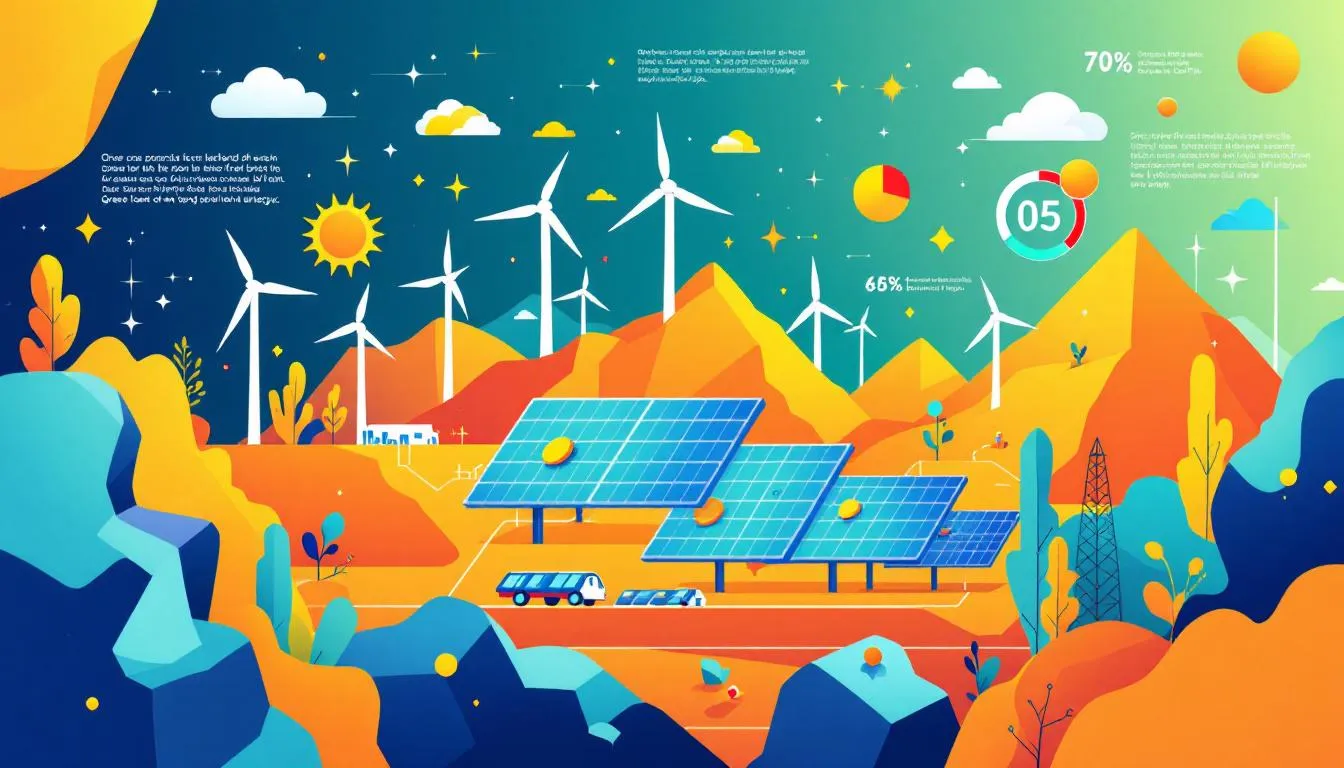
The rise of green tech startups in India is a testament to the increasing public awareness of climate change and pollution. Technological advancements have made it easier for these startups to build and scale their solutions, contributing significantly to the renewable energy and sustainability landscape. These startups are not just balancing economic growth with environmental responsibilities but transforming how we manage resources, integrating renewable energy, energy efficiency, and waste management technologies into their innovative solutions.
As cleantech startups continue to enhance energy production, distribution, and consumption, their long-term impact is expected to shift the nation towards environmental consciousness. By 2025, these startups will likely focus on areas such as:
Microplastic remediation
Eco-friendly Li-ion battery recycling. Advanced recycling processes now focus on extracting black mass from used batteries, which is then refined to obtain battery grade materials while removing heavy metals to minimize environmental impact.
Zero-emission power generation These efforts further align with sustainability goals and set a precedent for a more sustainable future.
Renewable Energy Pioneers
India’s renewable energy sector is rapidly evolving, with each renewable energy startup playing a pivotal role in spearheading innovative solutions for sustainable energy production. These pioneers are not just contributing to the country’s energy transition but also ensuring the availability of affordable energy for all.
From rooftop solar systems to large-scale solar plants, these startups are leading the charge. Freyr Energy and ReNew Power are two such companies that stand out in this space. Their solar technologies are designed to generate electricity efficiently from renewable sources. They are driving the adoption of solar energy solutions and enhancing energy storage capabilities, making clean energy more accessible to remote communities and reducing reliance on traditional diesel generators.
Freyr Energy
Freyr Energy specializes in rooftop solar solutions, catering to various sectors including residential, commercial, and MSMEs. Their innovative SunPro+ app simplifies the management of solar installations, addressing challenges like manual maintenance and performance monitoring costs, thereby promoting the adoption of solar energy and enhancing energy efficiency. By optimizing solar installation performance, the SunPro+ app helps users save energy and reduce overall energy consumption.
ReNew Power
ReNew Power boasts a renewable energy capacity of 10.2 GW and has established significant partnerships, including those with Indian Oil Corporation and L&T for green hydrogen projects. Their joint venture with Fluence aims to enhance the energy storage sector, and their successful green bond issuance highlights their strong market position and commitment to a sustainable future.
Solar Power Innovations
Solar power innovations are at the forefront of India’s renewable energy revolution, offering cutting-edge solutions that make generating electricity more efficient and sustainable. One of the most exciting advancements is the rise of bifacial solar panels, which can produce electricity from both sides, harnessing reflected sunlight and boosting energy output by up to 25%. This leap in efficiency not only maximizes the use of available space but also accelerates the adoption of solar energy across diverse environments.
Another transformative development is the deployment of floating solar panels on reservoirs and lakes. These systems not only save valuable land but also reduce water evaporation and keep solar panels cooler, enhancing their performance. Additionally, the integration of energy storage systems with solar panels ensures a stable and reliable power supply, even when sunlight is intermittent. These innovations are crucial for reducing carbon footprints, supporting a sustainable future, and helping India meet its climate change commitments. As solar power technologies continue to evolve, they are making clean, renewable energy more accessible and affordable, driving the nation closer to its sustainability goals.
Waste-to-Value Innovations
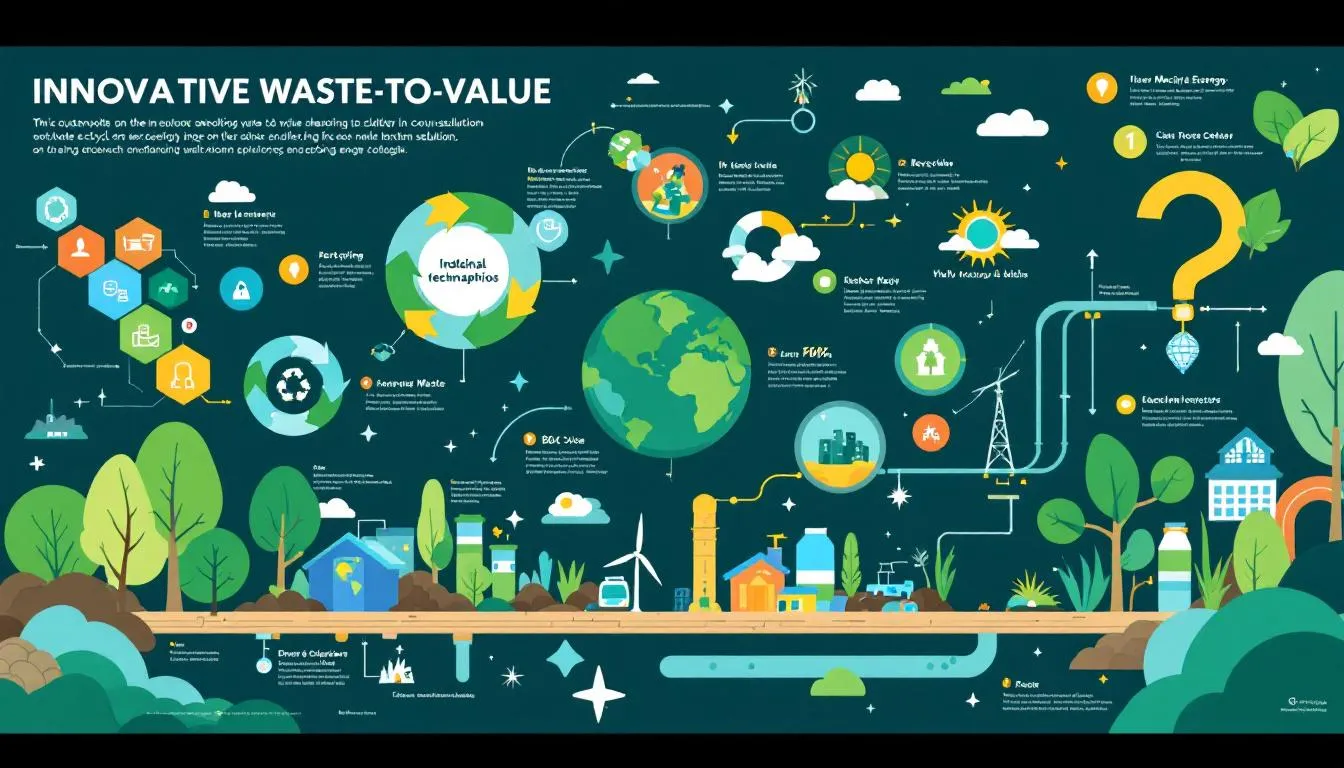
In the waste management industry, several Indian startups are focused on converting organic waste and food waste into energy and other valuable products, redefining the landscape. These innovative solutions not only contribute to environmental sustainability but also support the energy transition by creating renewable energy from organic materials and reducing the amount of wastes produced.
GPS Renewables and Recykal are standout examples in this sector. Their pioneering technologies in biomethanation and cloud-based waste management systems are setting new benchmarks for the waste-to-value industry, enhancing recycling capacity, and maximizing resource recovery.
GPS Renewables
GPS Renewables focuses on biomethanation technology to convert organic waste into renewable energy through anaerobic digestion. Their BioCNG plant in Indore, which converts 550 tonnes of organic waste daily into bio-CNG, is a prime example of their innovative solutions supporting local public transport.
With a significant joint venture with Oil India Ltd and plans to establish over 100 BioCNG plants across India by 2025, GPS Renewables is a leader in the BioCNG segment.
Recykal
Recykal provides cloud solutions for efficient waste management, integrating over 1,200 waste management service providers to streamline operations. Their platform supports Extended Producer Responsibility (EPR) compliance and has raised significant funding to enhance its capabilities and expand operations, including the management of e waste.
E-Waste Recycling Startups
E-waste recycling startups in India are making significant strides in tackling the growing challenge of electronic waste by deploying innovative solutions that recover valuable materials and minimize environmental impact. Leveraging advanced technologies such as artificial intelligence and machine learning, these startups are revolutionizing the way e waste is sorted, processed, and recycled. Robotic sorting systems, for example, can efficiently separate components and extract raw materials like copper, gold, and lithium, which are essential for manufacturing new electronics and batteries.
Some startups are pioneering closed-loop recycling processes, enabling the continuous reuse of materials and reducing the need for new raw material extraction. This not only conserves natural resources but also curbs the environmental impact associated with traditional waste disposal methods. By transforming waste into valuable resources, these companies are playing a vital role in building a circular economy, creating new economic opportunities, and supporting India’s journey toward sustainable development. Their innovative solutions are setting new benchmarks for the waste management industry and demonstrating the power of technology in driving environmental sustainability.
Sustainable Manufacturing Leaders
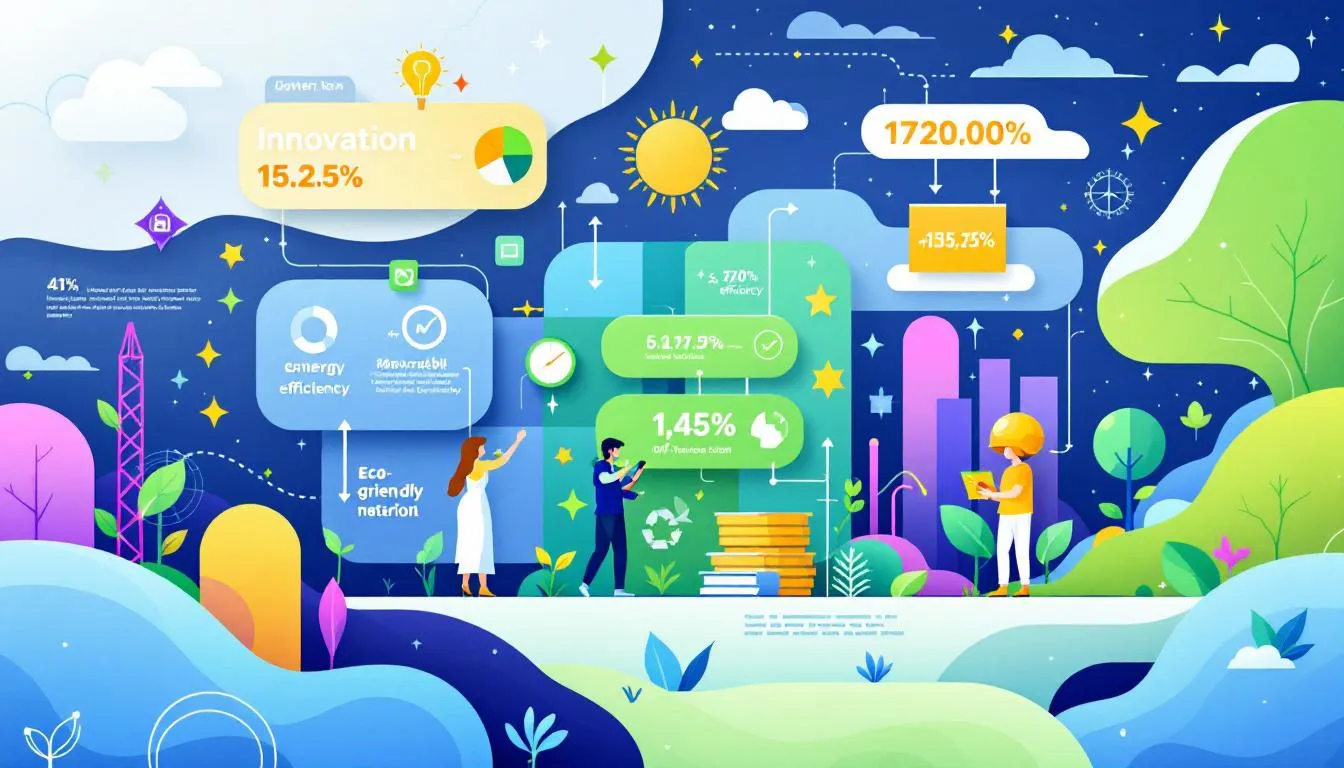
Sustainable manufacturing is another critical area where Indian startups are making a significant impact. By creating products from sustainable materials and adopting green manufacturing practices, these companies are not only reducing environmental impact but also enhancing profitability and compliance with stringent environmental regulations.
Proklean and MYNUSCo are leading the way in this domain. Their innovative solutions and sustainable product offerings highlight the potential for green manufacturing to achieve both environmental and economic goals.
Proklean
Proklean offers biodegradable cleaning solutions made from natural ingredients, providing an eco-friendly alternative to conventional cleaning products. Their innovative product offerings and effective market strategies have enabled them to achieve profitability and secure substantial investments for further expansion.
MYNUSCo
MYNUSCo manufactures eco-friendly products such as cutlery, utensils, and planters from biocomposites made from bamboo waste, rice waste, wood waste, and recycled plastics. Their brand ‘Eha’ is gaining traction, and they are planning for global expansion to promote sustainable materials and products worldwide.
Innovative Water Management Solutions
Water management is another area where innovative solutions are making a significant impact. Startups like Uravu Labs and Openversum are leveraging advanced technologies to enhance access to clean water, reflecting a commitment to environmental sustainability and resource conservation. Advanced water management technologies also help reduce energy consumption by optimizing system operations. This approach serves as a viable solution to pressing water issues.
DigitalPaani and WEGoT are two prominent startups in this sector, providing scalable solutions for efficient water management through innovative technologies and IoT-based systems.
DigitalPaani
DigitalPaani employs IoT technology to effectively monitor and manage water resources, enhancing operational efficiency across various sectors. With $1.2 million in seed funding, they are set to expand their water management technology, supporting sustainable water usage and better resource management.
WEGoT
WEGoT provides innovative water management solutions aimed at conserving water resources. Their IoT solutions have been implemented in over 100,000 smart devices, saving billions of liters of water through efficient management, thereby contributing to environmental sustainability.
Clean Energy Storage Technologies
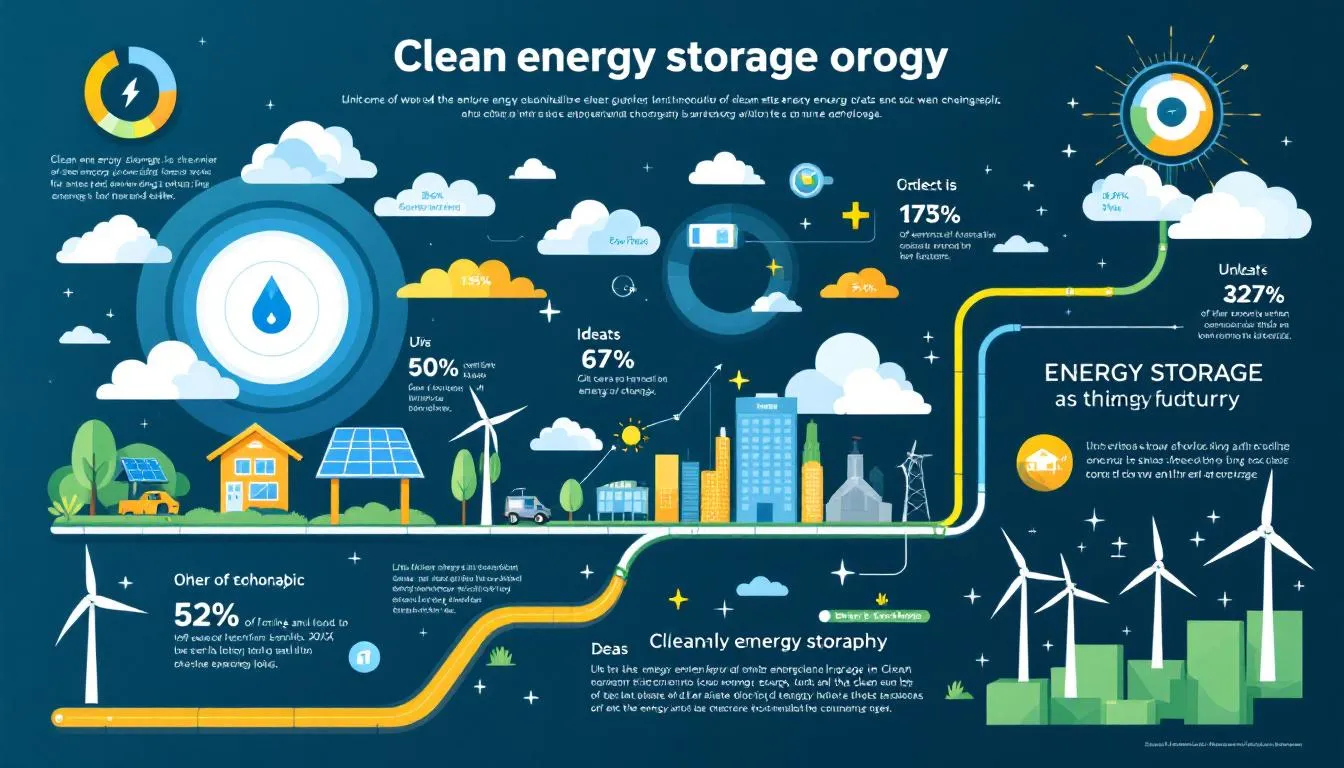
Energy storage is crucial for the stability and reliability of renewable energy supply. With the demand for essential materials like lithium and cobalt projected to surge, startups in this sector are developing innovative solutions to meet these needs.
ION Energy and TerraStor are notable players in clean energy storage technologies. Their advancements in battery management systems and grid-scale storage solutions are enhancing the integration of renewable energy and supporting the energy transition.
ION Energy
ION Energy’s flagship Battery Management System (BMS) facilitates the deployment of smart battery systems for various applications. Their innovative solutions enable effective management and optimization of battery performance, enhancing sustainability in energy use globally.
TerraStor
TerraStor utilizes heated compressed air technology to create grid-scale energy storage solutions, enhancing the integration of renewable energy and supporting the stability of the power grid. The system captures and utilizes heat generated during air compression, which improves overall energy storage efficiency.
Air Quality Improvement Initiatives
Improving air quality is a critical challenge, and startups are developing innovative solutions to address this issue. Companies like AQI India and Ambee are using IoT sensors, big data, and satellite data to provide real-time air quality insights, enhancing public awareness and enabling better decision-making.
Some startups are also developing emission control devices that specifically target the reduction of carbon monoxide alongside other pollutants.
Clairco and Devic Earth are two startups making significant strides in this area. Their technologies are not only improving air quality but also contributing to environmental sustainability by reducing carbon emissions.
Clairco
Clairco uses IoT-based monitoring and low-drag air filters to convert existing air conditioning units into smart air purifiers. With a successful funding round in March 2021, Clairco is expanding its reach and charging a monthly subscription fee for its air purification services.
Devic Earth
Devic Earth develops air pollution control equipment called ‘Pure Skies’ that aims to significantly lower particulate matter levels across various industries. Their technology improves air quality by reducing the concentration of harmful particulate matter, contributing to a healthier environment.
Carbon Capture Technologies
Carbon capture technologies are emerging as a cornerstone in the fight against climate change, offering powerful solutions to reduce greenhouse gas emissions and pave the way for a more sustainable future. These technologies work by capturing carbon dioxide emissions from power plants, industrial facilities, and other major sources before they can enter the atmosphere. One of the most promising approaches is post-combustion capture, which extracts carbon dioxide from flue gases, allowing for its safe storage or conversion into useful products.
Another innovative process is bioenergy with carbon capture and storage (BECCS), which combines renewable biomass energy production with carbon capture, effectively removing carbon emissions from the energy cycle. These technologies not only help lower carbon emissions but also open up new avenues for producing low-carbon fuels, chemicals, and building materials. By integrating carbon capture into existing industrial processes, India can significantly reduce its carbon footprint, support economic growth, and move closer to achieving its sustainability and climate change mitigation goals. As these solutions scale, they will play a vital role in shaping a cleaner, more resilient energy future.
Electric Vehicle Revolution
The electric vehicle (EV) revolution is gaining momentum in India, with startups making significant strides in developing advanced EV technologies, including efficient, fast-charging ev batteries and innovative solutions for zero-emission transportation.
Clean Electric and Blue Energy Motors are leading this revolution. Their contributions to fast-charging lithium-ion batteries and zero-emission electric trucks are not only enhancing the EV market but also supporting the shift towards renewable energy and sustainability goals, which ultimately help to produce electricity.
Clean Electric
Clean Electric develops lithium-ion batteries capable of fast charging in just 12 minutes, integrating nickel manganese cobalt and lithium iron phosphate cells for enhanced performance. Competing with Exponent Energy and EMO Energy, Clean Electric is making significant strides in the EV market.
Blue Energy Motors
Blue Energy Motors develops electric trucks designed for zero-emission transportation, focusing on providing environmentally friendly solutions for the logistics sector. Their electric trucks contribute to zero emissions, aligning with sustainability goals and reducing the environmental impact of transportation.
Government Support and Incentives
Government support and incentives play a crucial role in fostering the growth of green tech startups in India. Initiatives such as tax breaks, subsidies, and recognition from DPIIT encourage startups to develop innovative solutions and offset high upfront costs.
Programs like Startup India, Make in India, and Atmanirbhar Bharat provide various benefits, including tax exemptions, credit guarantees, and funding opportunities, enhancing the startup ecosystem and promoting domestic manufacturing.
Additionally, schemes like Mudra Loan and Stand Up India offer financial support to entrepreneurs, particularly women and SC/ST communities, contributing to economic growth and sustainability goals.
Challenges and Risk Management
Despite the promising growth, green tech startups face several challenges that must be navigated carefully. Engaging with stakeholders such as employees, consumers, and investors is crucial, as there is an increasing demand for environmentally responsible practices. Aligning business practices with consumer and investor expectations can help startups manage these challenges effectively.
Moreover, DPIIT recognition allows startups to self-certify compliance with several labor and environmental laws, easing regulatory burdens and allowing more resources to be allocated towards innovation and sustainability. This strategic approach helps startups focus on their core objectives while ensuring regulatory compliance.
Future Outlook for Green Tech in India
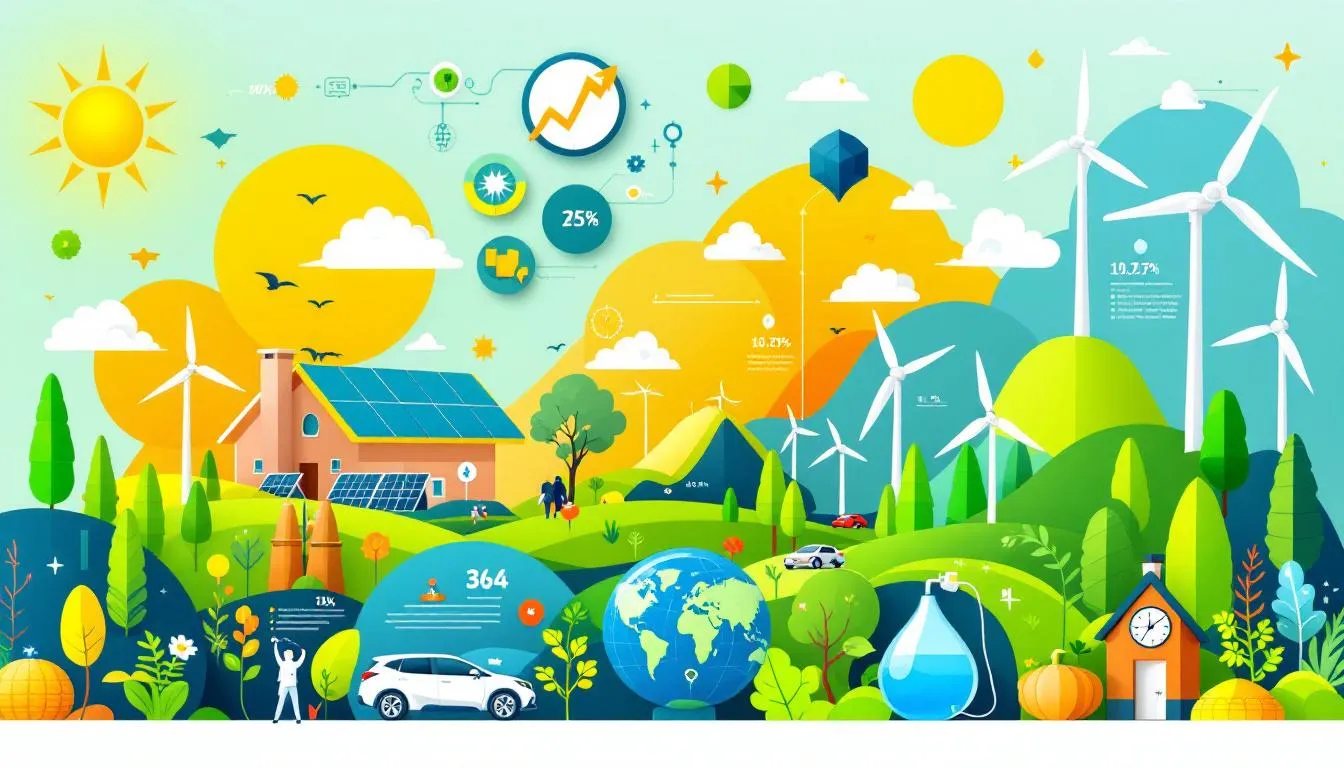
The future of green tech in India looks incredibly promising. The sector is expected to generate millions of jobs and significantly contribute to the GDP by 2030. While long-term planning is essential for achieving measurable sustainability results, this can delay short-term benefits. However, the rising trend of solar energy and electric vehicles positions green startups as key players in India’s sustainability journey.
This growth is not just a passing trend but a movement towards sustainability, reflecting a broader shift in India’s industrial landscape. Startups in the water management sector, such as WEGoT, have already made significant strides, saving billions of liters of water through innovative IoT-based solutions. Additionally, MYNUSCo’s focus on eco-friendly products using renewable materials aims to establish a global biocomposite cluster.
Case Studies of Successful Startups
Case studies of successful startups provide valuable insights into the potential for financial success in the green tech sector. Many startups secure initial funding through a seed round before advancing to Series A and beyond. Pi Green Innovations secured $4.5 million in its Series A round, exemplifying the financial viability of innovative solutions. Similarly, OxyGarden’s $1.7 million funding showcases the investor interest in environmental innovations.
Greenjoules, which raised $4.5 million in Series A funding, plans to set up a large biorefinery facility near Pune to enhance its production processes capabilities.
Metastable Materials, supported by Sequoia’s Surge, operates an urban mining facility capable of processing valuable materials at 1,500 tonnes annually, highlighting significant operational capacity and strategic market positioning.
Marketing and Branding Strategies
Building a brand centered on sustainability is crucial for green tech startups. This approach fosters trust and attracts eco-conscious consumers and investors. A sustainability-focused brand must clearly communicate its core values and purpose to effectively resonate with its audience.
Understanding the unique selling proposition of a product helps distinguish a startup from competitors, showcasing its benefits and innovative solutions. Engaging with community stakeholders through events and utilizing technology to improve supply chain transparency further enhances the credibility and visibility of a green tech brand.
Essential Machinery and Equipment
The success of green and clean-tech startups heavily depends on the appropriate machinery and equipment that can ensure sustainable and efficient operations. For instance, GPS Renewables develops biomethanation technology and operates BioCNG plants, providing essential machinery for renewable energy production.
Proklean offers biodegradable cleaning solutions produced with sustainable manufacturing equipment, promoting eco-friendly practices. Similarly, MYNUSCo focuses on producing biocomposites from renewable materials utilizing advanced manufacturing techniques, emphasizing sustainability.
Raw Materials and Inputs
Building a sustainable supply chain requires extensive auditing and collaboration with suppliers to ensure compliance with eco-friendly standards. The shift to low-carbon manufacturing in India necessitates a reliable supply of renewable energy and materials, particularly as demand for rare earth elements has surged.
India’s dependence on imports for solar components has increased, with over 92 percent of the necessary raw materials currently acquired from foreign sources. To address this, the government has initiated projects such as Khanij Bidesh India Limited (KABIL) to secure international partnerships for sourcing critical minerals. In addition, the battery industry requires a consistent supply of battery grade materials to support the production of high-performance energy storage solutions.
Investment and Project Costs
Investment opportunities in India’s green tech sector are abundant, particularly in renewable energy projects and eco-friendly consumer goods. Foreign investors are increasingly interested in India’s green tech market due to its large population and low operating costs.
However, implementing green initiatives often involves high initial investments, which can strain financial resources for startups. Setting up clean-tech startups typically requires substantial investments covering land acquisition, infrastructure development, and essential machinery.
While the cost of establishing renewable energy projects can vary based on technology and scale, solar projects generally require lower capital expenditure compared to wind projects. Operational costs post-establishment, including maintenance and workforce expenses, are also critical factors in assessing project viability.
Licenses and Registrations
Licenses and registrations are crucial for green and clean-tech startups in India as they ensure compliance with regulatory frameworks and improve credibility. To be eligible for DPIIT recognition, a startup must be incorporated as a Private Limited Company, Registered Partnership Firm, or Limited Liability Partnership, and should not exceed an annual turnover of Rs. 100 crore.
Ensuring compliance with licensing and registration requirements is vital for the operational integrity and success of green and clean-tech startups. This not only helps in securing government incentives and subsidies but also enhances the startup’s market positioning and investor confidence.
Profitability and ROI
Venture capital firms play a vital role in scaling green tech startups by providing seed capital and mentorship. While the initial investment in green technologies can be a barrier, it often results in long-term financial benefits through sustainability and compliance with regulations.
Investments in renewable energy sources within manufacturing can reduce dependency on fossil fuels, leading to lower energy costs over time. However, transitioning to sustainable practices can lead to increased operational costs, making it challenging for startups to maintain profitability. The competition from non-sustainable companies offering lower prices poses a significant market risk.
Therefore, careful financial planning is essential to ensure that the benefits of integrating eco-friendly practices outweigh the costs.
Summary
In summary, green tech startups in India are at the forefront of driving sustainable innovation, from renewable energy and waste management to sustainable manufacturing and water management. These startups, supported by government incentives and driven by technological advancements, are making significant strides towards a more sustainable future. While challenges exist, the potential for economic growth and environmental sustainability is immense. As India continues to embrace green technology, the future looks promising for startups committed to making a positive impact on the planet.
Frequently Asked Questions
What is a greentech startup?
A greentech startup focuses on leveraging technology to create positive environmental impacts, such as reducing CO2 emissions, minimizing waste, and promoting sustainability. These companies are fundamentally driven by the goal of enhancing environmental well-being through innovative solutions.
What are green tech startups?
Green tech startups are companies focused on creating innovative solutions that enhance environmental sustainability, including areas like renewable energy, waste management, and resource conservation. Their purpose is to address pressing ecological challenges and promote a healthier planet.
How do government incentives support green tech startups in India?
Government incentives, including tax breaks, subsidies, and recognition from the DPIIT, are crucial in reducing upfront costs and fostering innovation for green tech startups in India. These measures significantly enhance financial support and encourage the growth of sustainable technologies.
What challenges do green tech startups face?
Green tech startups face significant challenges, including high initial investment costs, navigating regulatory compliance, competition from non-sustainable companies, and the necessity for effective stakeholder engagement to meet consumer and investor expectations.
What is the future outlook for green tech startups in India?
The future outlook for green tech startups in India is highly promising, as they are projected to generate millions of jobs and significantly boost GDP. With the increasing adoption of solar energy and electric vehicles, these startups will play a crucial role in advancing the country’s sustainability goals.
Hear from Our Satisfied Clients



